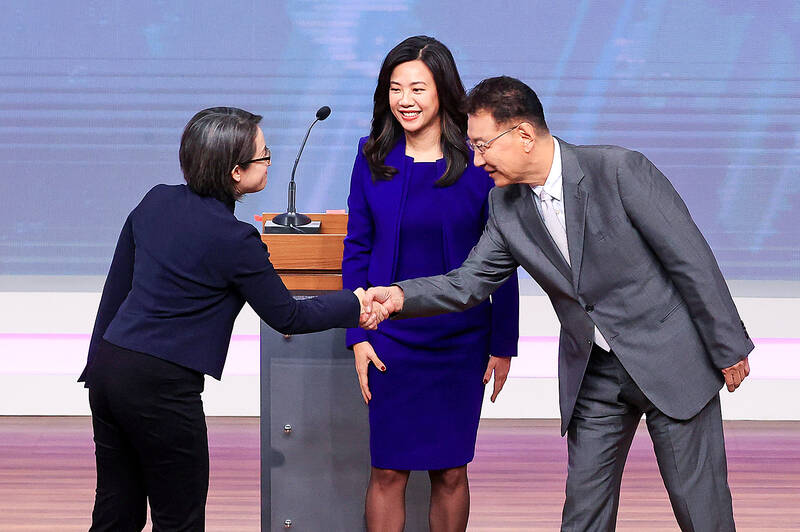Opposition vice presidential candidates challenged the government’s energy policy during Monday’s televised debate, while the ruling Democratic Progressive Party’s (DPP) vice presidential candidate questioned their positions on nuclear power.
Since taking power in 2016, the government’s energy policy has focused on phasing out nuclear power and running an electricity mix of 50 percent natural gas, 30 percent coal and 20 percent from renewable energy sources by next year.
Opposition parties have criticized the policy, especially as the rollout of renewable energy sources has lagged behind schedule, arguing in favor of maintaining Taiwan’s nuclear power generation capabilities.

Photo: EPA
The DPP’s candidate, Hsiao Bi-khim (蕭美琴), questioned the Chinese Nationalist Party’s (KMT) nuclear energy policy and asked how it could support its claims.
KMT presidential candidate Hou You-yi (侯友宜) has proposed raising the proportion of nuclear power in the nation’s energy mix to 18 percent by 2050, while his running mate, Jaw Shaw-kong (趙少康), has endorsed a target of 25 percent, said Hsiao, a former representative to the US.
She asked whether more nuclear power plants would have to be built to meet those targets and where the nuclear waste would go.
“The [five] DPP-governed cities and counties have all rejected the idea of building new nuclear power plants. Do KMT mayors and county commissioners agree to have new nuclear power plants in their cities and counties?” Hsiao asked.
Jaw said each of Taiwan’s three nuclear power plants that were or remain active could have housed four reactors instead of two, and that the mothballed Fourth Nuclear Power Plant was originally designed to house eight reactors, implying no new facilities would have to be built.
The Broadcasting Corp of China chairman said that the residents of Pingtung County’s Hengchun Township (恆春) who live close to the Ma-anshan Nuclear Power Plant support its continued operation, because they get subsidies without being exposed to health risks, as nuclear power is safe.
Jaw was referring to remarks by the Hengchun Township mayor in August that at least 70 percent of local residents supported the plant’s continued operation.
The two reactors at that plant are scheduled to stop operating in July and May next year when their 40-year operating permits expire.
Regarding nuclear waste, Taiwan should follow the US’ strategy of burying it deep in the ground, Jaw said.
Taiwan’s three nuclear power plants accounted for 16 to 20 percent of all power generated in the nation from 2000 to 2014, and 11 to12 percent from 2016 to 2021 after the first plant’s permits expired and it was shut down.
Taiwan People’s Party Legislator and vice presidential candidate Cynthia Wu (吳欣盈) called the “no nuclear homeland” proposal an ideology that has forced the acceleration of the development of renewable power installations, resulting in corruption and misconduct.
She said that as the economy relies heavily on the manufacturing sector, Taipei has to be realistic in terms of its energy policy.

‘DENIAL DEFENSE’: The US would increase its military presence with uncrewed ships, and submarines, while boosting defense in the Indo-Pacific, a Pete Hegseth memo said The US is reorienting its military strategy to focus primarily on deterring a potential Chinese invasion of Taiwan, a memo signed by US Secretary of Defense Pete Hegseth showed. The memo also called on Taiwan to increase its defense spending. The document, known as the “Interim National Defense Strategic Guidance,” was distributed this month and detailed the national defense plans of US President Donald Trump’s administration, an article in the Washington Post said on Saturday. It outlines how the US can prepare for a potential war with China and defend itself from threats in the “near abroad,” including Greenland and the Panama

The Chinese Nationalist Party (KMT) is maintaining close ties with Beijing, the Democratic Progressive Party (DPP) said yesterday, hours after a new round of Chinese military drills in the Taiwan Strait began. Political parties in a democracy have a responsibility to be loyal to the nation and defend its sovereignty, DPP spokesman Justin Wu (吳崢) told a news conference in Taipei. His comments came hours after Beijing announced via Chinese state media that the Chinese People’s Liberation Army’s Eastern Theater Command was holding large-scale drills simulating a multi-pronged attack on Taiwan. Contrary to the KMT’s claims that it is staunchly anti-communist, KMT Deputy

RESPONSE: The government would investigate incidents of Taiwanese entertainers in China promoting CCP propaganda online in contravention of the law, the source said Taiwanese entertainers living in China who are found to have contravened cross-strait regulations or collaborated with the Chinese Communist Party (CCP) could be subject to fines, a source said on Sunday. Several Taiwanese entertainers have posted on the social media platform Sina Weibo saying that Taiwan “must be returned” to China, and sharing news articles from Chinese state media. In response, the Mainland Affairs Council (MAC) has asked the Ministry of Culture to investigate whether the entertainers had contravened any laws, and asked for them to be questioned upon their return to Taiwan, an official familiar with the matter said. To curb repeated

Myanmar has turned down an offer of assistance from Taiwanese search-and-rescue teams after a magnitude 7.7 earthquake struck the nation on Friday last week, saying other international aid is sufficient, the National Fire Agency said yesterday. More than 1,700 have been killed and 3,400 injured in the quake that struck near the central Myanmar city of Mandalay early on Friday afternoon, followed minutes later by a magnitude 6.7 aftershock. Worldwide, 13 international search-and-rescue teams have been deployed, with another 13 teams mobilizing, the agency said. Taiwan’s search-and-rescue teams were on standby, but have since been told to stand down, as